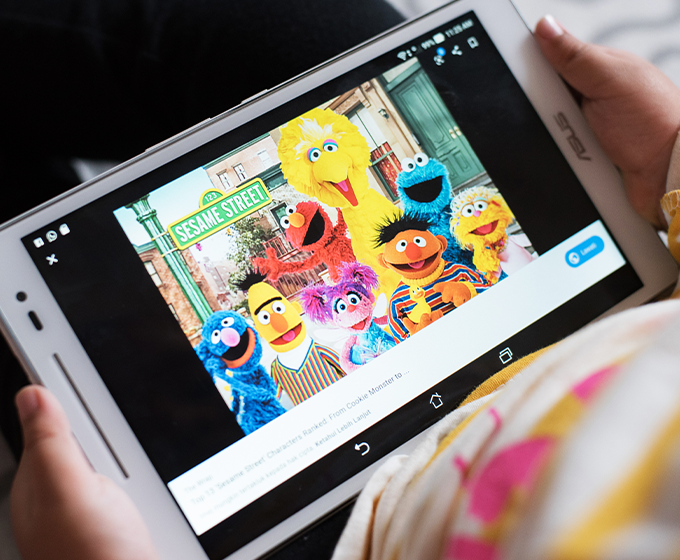
APRIL 8, 2021 – Melissa Williamson, an interdisciplinary learning and teaching lecturer in UTSA’s College of Education and Human Development is lending her expertise to a special community summit: “How Traumatic Experiences Affect Learning.” In partnership with San Antonio PBS station KLRN and Sesame Street in Communities, the virtual summit gathers local community experts to discuss how traumatic experiences can impact learning.
“I will be sharing the importance of understanding what trauma is and how as adults our own negative experiences can have an impact on how we raise our children,” Williamson said. “It is also important to note that the majority of us have been impacted by adverse childhood experiences.”
Research shows that chronic exposure to trauma affects children’s brains, specifically the amygdala, hippocampus and prefrontal cortex. These brain regions control our executive functions, such as planning, memory, focusing attention, impulse control and using new information to make decisions.
However, with trauma all these essential brain functions can be impaired. Chronic trauma exposure, whether real or perceived, also has adverse consequences. In the long term this can diminish a child’s ability to differentiate between genuine threats or safe situations, and it can impair their ability to learn and interact with others, and it may lead to serious anxiety disorders.
According to the 2009 National Survey of Children’s Exposure to Violence, 61% of children and adolescents who are 17 and younger have been exposed to violence in the past year. Over one-third of children experienced two or more direct victimizations. Over the course of a lifetime, about one in two children will have experienced violence.
 Melissa Williamson
Melissa WilliamsonWilliamson is a certified trauma professional and has vast expertise in understanding trauma and the brain structure that impact learning. Her expertise comes not only from personal experience but also from her research. She has worked as an early childhood professional learning consultant who brings this and many other important topics to audiences across the country.
By understanding and responding to trauma, parents and educators can build positive learning environments. “Trauma-informed” approaches are based on the belief that a child’s actions are a direct result of their experiences, and when he or she acts out or disengages, the question we should ask is not “What’s wrong with you?” but rather “What happened to you?” By being sensitive to a kid’s past and current experiences with trauma, caretakers can break the cycle of trauma, prevent retraumatization and engage a child in learning.
“The Sesame Street in Communities initiative is key to providing some of our nation’s most vulnerable young learners with a strong foundation,” said Debra Sanchez, senior vice president for education and children’s content operations for the Corporation for Public Broadcasting. “We are proud to extend our partnership with Sesame Workshop at this critical time to reach communities across the country when the pandemic has impacted so many.”
The virtual event, held in English and Spanish, is part of the Sesame Street in Communities initiative, which in its second year deepens Sesame Workshop and PBS KIDS’ longstanding commitment to using the power of public television to bring critical early learning to children across the country in communities big and small.
UTSA Today is produced by University Communications and Marketing, the official news source of The University of Texas at San Antonio. Send your feedback to news@utsa.edu. Keep up-to-date on UTSA news by visiting UTSA Today. Connect with UTSA online at Facebook, Twitter, Youtube and Instagram.
Move In To COLFA is strongly recommended for new students in COLFA. It gives you the chance to learn about the Student Success Center, campus resources and meet new friends!
Academic Classroom: Lecture Hall (MH 2.01.10,) McKinney Humanities BldgWe invite you to join us for Birds Up! Downtown, an exciting welcome back event designed to connect students with the different departments at the Downtown Campus. Students will have the opportunity to learn about some of the departments on campus, gain access to different resources, and collect some giveaways!
Bill Miller PlazaJoin us for an intimate evening of cocktails, conversation, and culinary inspiration with Pati Jinich, Emmy-nominated chef and James Beard Award-winning author. Enjoy light bites and signature drinks in the warm, modern setting of Mezquite as Pati connects with guests over her passion for Mexican cuisine and storytelling.
Mezquite Restaurant in Pullman Market, 221 Newell Ave., San Antonio 78215From inspired courses to thoughtful pairings and a rich sense of community, the Ven a Comer Signature Dinner is a night of shared meals, shared stories, and unforgettable flavor.
Stable Hall (Pear Brewery), 307 Pearl Pkwy, San Antonio 78215Come and celebrate this year's homecoming at the Downtown Campus with food, games, giveaways, music, and more. We look forward to seeing your Roadrunner Spirit!
Bill Miller PlazaThe University of Texas at San Antonio is dedicated to the advancement of knowledge through research and discovery, teaching and learning, community engagement and public service. As an institution of access and excellence, UTSA embraces multicultural traditions and serves as a center for intellectual and creative resources as well as a catalyst for socioeconomic development and the commercialization of intellectual property - for Texas, the nation and the world.
To be a premier public research university, providing access to educational excellence and preparing citizen leaders for the global environment.
We encourage an environment of dialogue and discovery, where integrity, excellence, respect, collaboration and innovation are fostered.